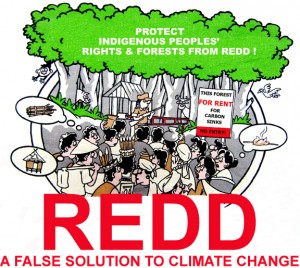Dickinson to Durban » Climate Change, Key COP17 Issues » Who knew a win-win situation could have losers?
Who knew a win-win situation could have losers?
By Sam Pollan, ‘14
REDD, or Reducing Emissions from Deforestation and Forest Degradation, has been a major theme for several years in international negotiations. On the surface, REDD appears to be a very straightforward, practical method for climate change mitigation. After the first full day of the Conference, it appeared that this was the case. I interviewed Dr. Glenn Bush of the Woods Hole Research Center. Dr. Bush is an environmental economist who is examining economic and equity issues associated with REDD projects. When asked about the possibility of opposition to REDD in negotiations, he said that REDD is essentially a win-win situation and should see significant progress during the coming weeks.
A separate interview with World Agroforestry Centre Head of Communications Paul Stapleton reaffirmed the anticipated success of REDD deliberations. In addition, Stapleton mentioned the need for trees outside of forests to be included in REDD carbon assessments, especially considering that half of the world’s trees are outside of forests. Agroforestry, a subject I researched thoroughly this past semester, has the potential for substantial benefits on several levels including not only carbon sequestration, but also diversification of income, erosion preventative, reducing nutrient demand from crops, and the fact that the longer a tree is alive the more profit can be made from its produce.
At the end of day one, REDD discussions outside of the plenary appeared very optimistic. Day two, however, marked a notable change in tone. I attended a side event on enforcement and anti-corruption measures for REDD in the Hex River Room. The discussions brought to light the rampant corruption, fraud, and organized crime associated with illegal logging. In Indonesia, 20 percent of all deforestation was determined to be done illegally in areas that were either protected or had restricted access. Andrea Johnson, who I will be interviewing in the next few days, noted three areas that need to be addressed for a successful implementation of REDD: law enforcement is essential for equity and success, building enforcement institutions, and including civil society in anti-corruption measures. These issues have a relatively quick fix with long-term social benefits and I found it interesting that none of my earlier interviews addressed this problem.
The final speaker of that side event, a representative of an indigenous group from Peru spoke about the problems of Carbon Cowboys falsely representing themselves as UN representatives and coercing indigenous people to sign away their land. At a later event, other issues with the actual implementation of REDD were addressed, specifically the problem with tree plantations. Tree plantations are the most common form of reforestation efforts. They involve monocropping an area with one type of typically non-native tree species for future harvest. This not only has several deleterious effects on the local environment, but also fails to accomplish the goal of carbon sequestration when the trees are cut down to be converted into paper products. What started as a seemingly one-dimensional component of climate negotiations is, in reality, quite multifaceted.
Filed under: Climate Change, Key COP17 Issues · Tags: COP17, Indigenous rights, REDD-Reducing Emissions from Deforestation and Forest Degradation, Sam Pollan, Woods Hole Research Center, World Agroforestry Centre









Recent Comments